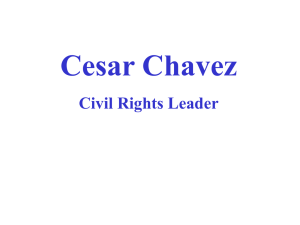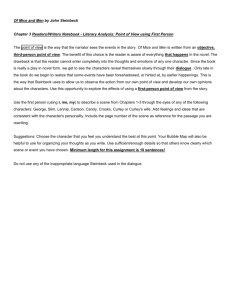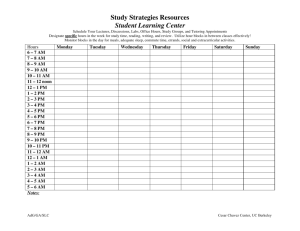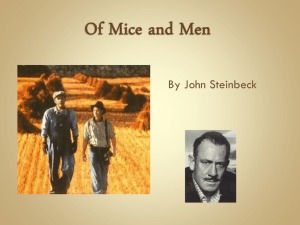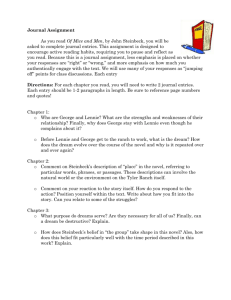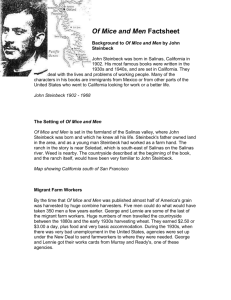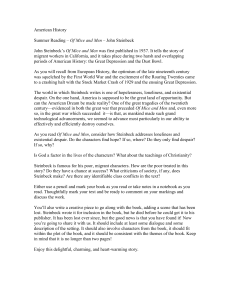Of Mice and Men
advertisement
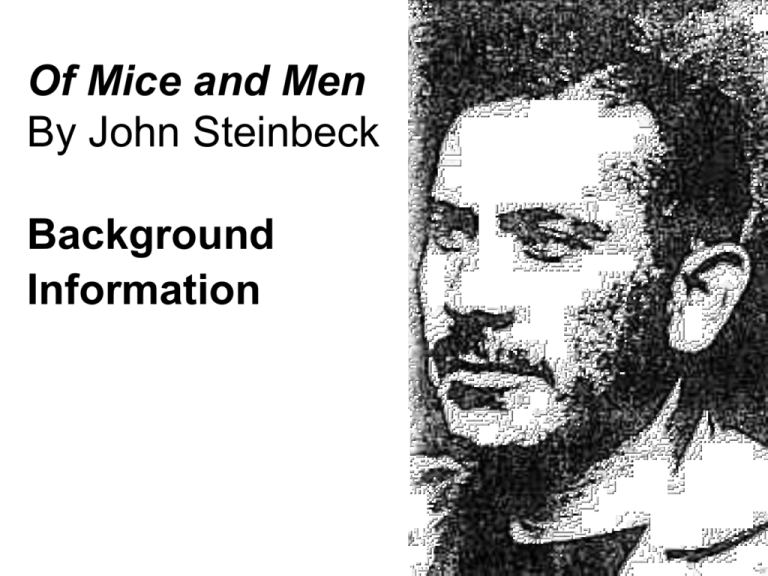
Of Mice and Men By John Steinbeck Background Information John Steinbeck • The author, John Steinbeck, was born in Salinas, • • • • California in 1902. In college, he worked as a laborer dredging canals alongside migrant workers. Steinbeck was often angered by biased reports in newspapers portraying migrant workers as untrustworthy & dangerous. He attended Stanford University but never graduated. Steinbeck’s novels are about economic problems of rural labor & social injustices. • John Steinbeck 1902 - 1968 Time Period • • • • • • After WWI, there was a market drop in farm prices, which meant more work for the same amount of money. The stock market crashed in 1929. In 1933, nearly 25% of the people in the U.S. were unemployed. Because of the “Dust Bowl” in the Great Plains, many people headed to California. These travelers were nicknamed Okies. Most workers did not achieve their dreams because there were too many workers and not enough jobs. Migrant work was grueling, challenging, and unrewarding for most. 1930s - Great Depression • Began when the stock market • crashed in October, 1929 Businesses failed, factories closed – People were out of work – Even people with money suffered because nothing was being produced for sale. • No money to replenish what • was borrowed Didn’t realize the effect it would have What About the People? • Farmers were already feeling the effects – Prices of crops went down – Many farms foreclosed • People could not afford luxuries – Factories shut down – Businesses went out • Banks could not pay out money • People could not pay their taxes – Schools shut down due to lack of funds • Many families became homeless and had to live in shanties Many waited in unemployment lines hoping for a job. People in cities would wait in line for bread to bring to their family. Some families were forced to relocate because they had no money. A Farm Foreclosure *FDR* • When he was inaugurated unemployment had increased by 7 million. • Poor sections (like Harlem) had 50% of the pop. unemployed • Instated the “New Deal” • It wasn’t till President Roosevelt took over and tried to put the economy back together that people even saw a glimmer of hope Why did people start to move to California? • Mild climate=longer growing season=longer work=more money • Easy route (Highway 66—Route 66) • Fliers distributed in places with the highest unemployment rates Migrant Workers & Cesar Chavez • Cesar Chavez-The Chavez family had a small farm, and ran a country store. As the Depression intensified and years of drought forced thousands off the land, the Chavez family lost both their farm and store in 1937. Cesar was 10 years old when the family packed up and headed for California. They joined the ranks as migrant farm workers. • These were difficult years, sleeping by the side of the road, moving from farm to farm, from harvest to harvest. Cesar would attend 38 different schools until he finally gave up after finishing the 8th grade. • As Cesar learned the hard lessons of life, he absorbed important values from his parents. His mother taught him to care for the less fortunate and the power of love (goes along with the love that Lennie and George show for one another). Cesar Chavez Cont. • In the early 1940s the Chavez family settled in Delano, a • • small farm town in the California’s San Joaquin valley, where Cesar would spend his teenage years. He ended up marrying his high school sweetheart, Helen. As an adult, Chavez developed as a leader, activist, and organizer. Even after the Great Depression, Chavez was determined to change the lives of many migrant farm workers by lobbying to improve working conditions in the fields and in the cities where the goods were sold. He always fought for the laborers or farmers. At the end of his life, he was a national symbol/hero, and will be remembered for the accomplishment that no one else had ever been able to do; build a union for farmworkers. Farm workers getting work cards under a Government Scheme (Murray & Ready) The Result of so many workers moving to California? Low Wages • Too many workers moving to California • Families could not support themselves • Traveled from crop to crop The Setting • Of Mice and Men is set in the farmland of the Salinas Valley in California, where John Steinbeck was born, and which he knew all his life. • This book was published in 1937. • The Great Depression defines the 1930s. • Steinbeck wrote mostly about migrant workers (those displaced during The Great Depression). • THE AMERICAN DREAM: • From the 17th Century, when the first settlers arrived, immigrants dreamed of a better life in America. • People went there to escape from persecution or poverty, and to make a new life for themselves or their families. • They dreamed of making their fortunes in the goldfields. • The American dream today tends to be about becoming rich. • For many the dream became a nightmare. The horrors of slavery, of the American Civil War, slums, and the corruption of the American political system led to many shattered hopes. A Dream Deferred* by Langston Hughes What happens to a dream deferred*? Does it dry up like a raisin in the sun? Or fester like a sore-And then run? Does it stink like rotten meat? Or crust and sugar over-like a syrupy sweet? Maybe it just sags like a heavy load. Or does it explode? * deferred = to put off action, to delay What does Langston Hughes say about dreams? He thinks if you defer (put off) your dream too long that you will never achieve it. Jack Bryant Firebaugh, 1940 Sunny Cal You've all heard the story Of old Sunny Cal The place where it never rains They say it don't know how. They say, "Come on, you Okies, Work is easy found Bring along your cotton pack You can pick the whole year round. Get your money ever' night Spread your blanket on the ground It' s always bright and warm You can sleep right on the ground." But listen to me Okies I came out here one day Spent all my money getting here Now I can't get away. Why the title Of Mice and Men? • The title of the novel comes from a poem by the Scottish poet Robert Burns (1759 96): – The best laid schemes o' mice and men Gang aft agley [often go wrong] And leave us nought but grief and pain For promised joy! Why the title? (cont’d.) • Translate the portion of the poem into your own words: – The best plans often fall apart and result in pain, rather than happiness. • What can you predict about the story, based on the title? – Not everything we plan will go the way we want. To A Mouse, On Turning Her Up In Her Nest With The Plough BY ROBERT BURNS 1785 Wee, sleekit, cow'rin, tim'rous beastie, O, what a panic's in thy breastie! Thou need na start awa sae hasty, Wi' bickering brattle! I wad be laith to rin an' chase thee, Wi' murd'ring pattle! Thou saw the fields laid bare an' waste, An' weary winter comin fast, An' cozie here, beneath the blast, Thou thought to dwellTill crash! the cruel coulter past Out thro' thy cell. I'm truly sorry man's dominion, Has broken nature's social union, An' justifies that ill opinion, Which makes thee startle At me, thy poor, earth-born companion, An' fellow-mortal! That wee bit heap o' leaves an' stibble, Has cost thee mony a weary nibble! Now thou's turn'd out, for a' thy trouble, But house or hald, To thole the winter's sleety dribble, An' cranreuch cauld! I doubt na, whiles, but thou may thieve; What then? poor beastie, thou maun live! A daimen icker in a thrave 'S a sma' request; I'll get a blessin wi' the lave, An' never miss't! But, Mousie, thou art no thy lane, In proving foresight may be vain; The best-laid schemes o' mice an 'men Gang aft agley, An'lea'e us nought but grief an' pain, For promis'd joy! Thy wee bit housie, too, in ruin! It's silly wa's the win's are strewin! An' naething, now, to big a new ane, O' foggage green! An' bleak December's winds ensuin, Baith snell an' keen! Still thou art blest, compar'd wi' me The present only toucheth thee: But, Och! I backward cast my e'e. On prospects drear! An' forward, tho' I canna see, I guess an' fear! About the Novel • Of Mice and Men was first published in 1937. • It is number 2 on the list of most frequently banned books. • Protagonists- George and Lennie • Antagonists- Curley, society, the predatory nature of human life Themes • The predatory nature of human existence • The importance of fraternity and idealized relationships between men • The American Dream • The destructive imbalance of social power structures in American society • The effects of isolation/loneliness Characters • Lennie- has a mild mental disability; loves to • pet soft things; possesses incredible physical strength George- short tempered but a devoted friend to Lennie; hopes to achieve their American dream; protects Lennie More Characters • Curley- the boss’s son; wears high heeled boots • • to distinguish himself from the other workers; mean-spirited; recently married Curley’s wife- the only female character; only known as “Curley’s wife”; represents female sexuality in a male-dominated world; referred to as a “tramp” Slim- the only character at peace with himself; the only character to understand the bond between George and Lennie; insightful Works Cited • “Of Mice and Men Factsheet.” English Resources. 1999. • • • http://www.newi.ac.uk/englishresources /workunits/ks4/diction/ofmicemen/llshort/factsheet.html. “The Fight in the Fields.” PBS. 28 August 2013. http://www.pbs.org/itvs/fightfields/cesarchavez.html. “The Most Frequently Banned Books in the 1990s.” Greenwood Press. 21 Nov. 2005. http://www.cs.cmu.edu/People/spok/most-banned.html. “The New Deal Network.” 21 Nov. 2005. http://newdeal.feri.org/library/7_31.htm.
